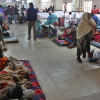A case of sheer negligence

Mazkura Ayub, 63, walks with faltering steps as she finds it difficult to put her feet flat on the ground. She also cannot move three fingers of her left hand.
This is all because of negligence in her treatment at Dhaka’s upscale United Hospital.
The Bangladesh Medical and Dental Council (BMDC) has recently cancelled the practice licence of the doctor in question, medicine consultant Nazmul Islam, for “inefficiency and violation of standard protocol”.
The Daily Star could not reach Nazmul for his comments. The hospital authorities declined to comment on the allegations.
“We are respectful of the BMDC’s decision,” Shagufa Anwar, head of communication and business development of United Hospital, told The Daily Star by phone on Wednesday.
Mazkura was admitted to the hospital on April 1 last year for treatment of drug- induced electrolyte imbalance. She was conscious and oriented at the time of admission.
When dissolved in water, chemicals in human blood stream called “electrolytes” (calcium, magnesium, potassium, and sodium) separate into positively and negatively charged ions. Human nerve reactions and muscle functions are dependent on the proper exchange of these ions outside and inside cells.
On Nazmul’s advice, Mazkura was treated with “immediate correction of the imbalance” and was given saline infusion at the Special Care Unit and later at the High Dependency Unit. She was there for 10 days.
As her husband Lutfe M Ayub saw a rapid correction of the sodium imbalance in blood culture reports on the morning of April 4, he raised the alarm and asked the doctor about its potential side effects.
The physician brushed aside his concerns although the patient was growing “paranoid, highly disoriented, agitated and would be talking continuously for hours,” reads the complaint.
On April 8, Mazkura started having movement disorders. Nazmul was shown “the increased twitching of the mouth and tremors at both hands” but he said such symptoms were common for someone suffering from high electrolyte imbalance.
Mazkura also complained that she felt like her hands were entangled in spider webs.
But the doctor suggested that the patient be released immediately because long stay in hospitals “generally leads to pneumonia,” according to the complaint filed with the BMDC, the regularity authority.
As the patient’s condition did not improve even after a week since release, Mazkura’s family took her to Samitivej Hospital Bangkok when they learned that she had suffered Central Pontine Myelinolysis.
The condition, wherein brain cells are damaged, was caused by the rapid medical correction of sodium deficiency at United Hospital, said Ayub, quoting doctors at the Bangkok hospital.
The BMDC investigation team came up with similar observations.
It blamed the doctor’s inefficiency, unscientific treatment methods, and violations of standard protocol for Mazruka’s prolonged suffering.
On November 1, the BMDC cancelled Nazmul’s registration for six months for “inefficiency and negligence” in treating Mazkura.
Quoting the Bangkok doctors, Ayub told The Daily Star in July this year that the “feeling like spider webs” occurs when nerve cells are damaged. Ayub, a businessman, described the negligence as “a breach of trust and unethical”.
“The doctor did not pay heed to her complaints and symptoms. It could turn worse if not for the treatment abroad,” he added.
Ayub and his family view Nazmul’s penalty as insufficient.
Once an active person, Mazkura is now confined to her house except for the days she needs to go to the Centre for the Rehabilitation of the Paralysed for her therapy, Ayub said.
Doctors told the victim’s family that her recovery would slow down after one year of treatment.
“She may never be like before … It will affect her psychologically and eventually it will affect me and other family members,” Ayub added

 For all latest news, follow The Daily Star's Google News channel.
For all latest news, follow The Daily Star's Google News channel. 








Comments